- Home
- Richard Adams
The Plague Dogs Page 5
The Plague Dogs Read online
Page 5
They wandered up and down the lines of hutches in the rabbitry, where experiments were being conducted to try to develop a food, similar to rat poison, which rabbits immune to myxomatosis would be eager to eat, with fatal results. Again, cost had proved a difficulty. A palatable and caustic poison, which burned through the intestines in twenty-four hours, had been tested successfully, but unfortunately its mass-production was not practicable at anything like an economic figure. A second poison, harmless to humans and cheap enough to produce, had been demonstrated by Dr. Boycott on television. On that occasion he had injected first a colleague and then a rabbit, the latter successfully dying in convulsions in less than two minutes under the cameras and the interested eyes of thousands of viewers. This poison, however, Dr. Boycott had so far not succeeded in making reasonably palatable, so that to date, injection remained the only means of administration. Of the possibilities of a certain sterility drug, however, he was more hopeful, and this was now being administered, in various forms and strengths, to both bucks and does. Rowf, having made several attempts to break into one of the hutches by leaping at the wire, and been requested by the rabbit inside to be so good as to let him die in peace, rejoined Snitter in his search for some way out other than the swing doors. They found none, and down to the next circle they went.
They searched the cat block, where cats were kept permanently in hoods covering their eyes and ears (in order to discover the effect upon cats of being kept permanently in hoods covering their eyes and ears). Here there was little noise or movement. Rowf, however, became fascinated by a single voice which kept repeating, "Oh dear, oh dear oh dear," in a tone expressive rather of worry than of actual suffering, and spent some time trying to track it to its source before Snitter, who had again failed to find any way out of the block, could persuade him onward.
They made their way through the aquarium block, where octopi, with or without the benefit of brain surgery, received electric shocks when they approached offered food (the purpose being to examine their capacity for remembering previous shocks and therefore not responding to stimuli or inducements that would result in their receiving another). The electric plates were switched off, the tanks dark and their occupants somnolent or at least torpid; but nevertheless the low, watery sounds, the lappings and gurglings filling the room, drove Rowf almost hysterical, so that it was he who pushed on to the next pair of doors while Snitter was still searching in vain for a negotiable open window.
They came to a halt at last in the guinea-pig house, where all manner of guinea-pigs--ginger, black, white, black-and-white, ginger-and-black, long-haired, short-haired, tragical-pastoral, tragical-comical-historical-pastoral--were kept in reserve for the needs of the station. A number had had one or more of their legs amputated--the interesting thing being that they possessed no power of adaptation, but continued to attempt to behave as though they had four legs. Here Snitter, having searched the entire room, at last stopped in the furthest corner, his nostrils pressed to the crack under the door. This was no swing door, but a heavier affair altogether, a door of the normal kind, painted green and shut as fast as the Arabian trees.
"Wet mud and rain," said Snitter. "Gutters and leaves! Smell."
Rowf put down his nose. Both could smell a steady rain falling in the darkness outside. Rowf pushed at the unyielding door.
"No good," said Snitter. "Postman's door--paper boy's door. Oh, never mind," he added, as Rowf remained silent and uncomprehending. "We've eaten down to the plate, that's all."
"No getting out? Can't we fight the postman?"
"Cats up a tree. Climb until the top branches bend. Then what? Hang yourself up on a cloud while you're thinking. Hang me up on another." As though to reassure himself, Snitter lifted his leg against the door, peed a moment and then sat back on his haunches, shivering in the damp draught and wisps of cloud-wrack blown in across the sill. "It's cold. My feet are cold."
"Burn," said Rowf suddenly.
"What?"
"Burn, over there. Smell of ashes. It'll be warmer. Come on."
There was indeed a perceptible source of heat--not much, but some--coming from the opposite side of the block, beyond the central mass of guinea-pig hutches piled in tiers. Turning his head in the direction towards which Rowf was looking, Snitter could not only smell the ashes but see, in the dim light, minute particles, dust and motes, swirling upwards in an air current that must be warmer than the rest of the room. Following Rowf round the hutches, he found him already sniffing at a square door of iron set in a frame of brickwork and projecting from the wall a little above the level of his head. It was ajar. Peering upwards, he could glimpse, within, the roof or upper side of a kind of metal cavern, which must be deep, for not only was a warm draught coming up it and a light drift of powdery ash, but also minute sounds, tinklings and crepitations, magnified as they echoed against the iron sides of the shaft.
"What is it?" asked Rowf, bristling as though for a fight.
"No animal; so put your teeth down. Swing thing--door of some kind. Get it a bit wider open."
Rowf made as if to push at it and Snitter quickly stopped him.
"No, no, you'll shut it that way. You have to nose them open, or else use your paws. Let me show you."
He stood up and rested his front paws on the projecting brickwork, thrust his muzzle into the crack of the opening and jerked his head sideways, levering the square of iron wide on its hinges. At once he backed nervously away, bristling as Rowf had done. The two dogs crouched together under the lowest tier of hutches facing the iron door.
"What is it?" repeated Rowf. "Something's been burning, some sort of death--bones--hair--"
"These creatures in here--whatever they are--the whitecoats must burn them. It's the same smell, you see, only burnt. Yes, of course," said Snitter. "Of course that's it. They burnt my head, you know, and the tobacco man keeps burning that thing he puts in his mouth. Obviously they burn these creatures in there."
"Why?"
"Don't be silly." Snitter went slowly back to the open door. "It's still warm in there. Dead things--but not cold. Hot bones, hot bones. I'll throw my head in." He put his paws up once more, peering into the mouth of the square, metal cavern. Suddenly he gave a whine of excitement.
"Fresh air," cried Snitter. "Sheep, rain! Smell underneath the ashes! I tell you--"
The brick-encased, iron chute, sloping downwards through the wall of the building, led directly into a small furnace, not unlike that of a greenhouse, sited just outside. This was used for burning not only rubbish, such as old surgical dressings, fouled straw and bedding from the hutches, but also the dead bodies of guinea-pigs and any other creatures small enough to be conveniently disposed of in this way. There had been a brisk fire that afternoon, which had included the truncated remains of some twenty guinea-pigs unable to be of further help to the station, as well as a couple of kittens and a mongoose. Tom, the lad who helped Tyson about the place, had been told to go and draw the furnace at about five o'clock but, knowing that Tyson was in a hurry to get away and was unlikely to come and see what sort of a job he had made of it, had merely raked quickly through the ashes and fragmentary remains of straw, bones and hair, and decided to leave the job of clearing out until Monday morning. Tyson had not specially told him to conclude by closing the doors both of the furnace and of the chute in Block 12, and he was certainly not the sort of lad to allow such a refinement to occur to his mind spontaneously--there being, as a matter of fact, little room to spare there, what with the heavy demands made upon it by the fortunes of Manchester United, the products of Messrs. Yamaha and the charms of Miss Nana Mouskouri. After he had gone, the fire had revived for a time in the strong through-draught, filling the guinea-pig block with a light smoke and the smell of burnt guinea-pig coming up the chute; but had then died out, the furnace gradually cooling as darkness fell and the wind sifted its way through the tinkling, clicking ashes.
"Fresh air," said Snitter again. "Yellow smell--prickles--bees-only fai
nt--and somewhere there's wet rhododendrons, too. Rhododendrons, Rowf!"
"What?"
"Gorse, the yellow. We could fall there! We could! We could fall there!"
Snitter gaped, showing teeth brown about the gums, the teeth of a dog recovered from distemper. He began trying to pull himself up and into the square opening of the chute, thrusting in his head and front paws and hanging a moment on the lip before falling back to the concrete floor. Rowf watched him.
"Is it hot?"
"No hotter than your dam's belly in the basket. Remember? But I can't get at the teat." "Get in there?"
"The rhododendrons, don't you see? Outside. Smell comes in, so dog can go out."
Rowf considered. "Smells come through cracks. So do mice. Dogs don't. Suppose there's nothing but a crack? You'll stick in there and die. Never get back."
"You damned flea-bitten street-corner bitch-jumper, why do you think I'm going on like this? Once you get your head in there, you can feel the wind, wide as your arse, and smell the rain." Snitter jumped up and again fell back, his wet muzzle grey with powdered ash. "Burn, little bones, burn! Like my head." He wiped at his nose with a fore-paw.
Rowf, the bigger dog, stood on his hind legs, rested his front paws on the lip of the chute and looked in. For some little while he remained thus, peering and listening. Then, without a word, he hoisted his body up and into the opening. His hind paws left the floor and for some moments kicked and scrabbled in the air, trying in vain to get a purchase on the iron lip. As he jerked himself forward, inch by inch, pulling and scraping as best he could with front paws pressed against the smooth iron floor of the chute, his penis caught on the sill of the door and was forced painfully downwards. He rolled on one side and as he did so succeeded in getting the claws of one hind paw as far as the projecting hinges. Using this purchase, he thrust himself forward and slowly disappeared from Snitter's view, his hind legs, with tail between, stretching out backwards and dragging behind him in the tunnel.
Snitter, full of frustration, remained running backwards and forwards in front of the open door. Several times more he jumped up at the opening and fell back, until at length, giving up, he lay down, panting, on the floor.
"Rowf?"
There was no answer from the tunnel.
Snitter got up and backed slowly away from the door, as though trying to get a better view inside.
"Rowf?"
There was still no answer, and beyond the lip he could see nothing.
"Hoop-la sugar lump!" barked Snitter suddenly. Running forward, he took a flying leap at the opening, like a circus dog jumping through a hoop. He felt his hind legs strike hard against the metal lip and gave a single, quick yap of pain; then, realizing that his body was more than half into the hole, he rolled on his side as Rowf had done and, being smaller, drew his rump and hind paws in without difficulty. For a few moments he lay gasping as the pain in his legs subsided, then collected himself and smelt ahead.
Rowf's body was blocking the square tunnel in front of him. No draught was coming up it and no smell except the metal water dog-smell of Rowf. Snitter began to feel afraid. In this tunnel he could not turn round, evidently Rowf could not hear him and worst of all, Rowf's body seemed not to be moving.
He crept forward until his head was lying upon Rowf's trailing hind legs. Only now did he perceive that Rowf was in fact moving, but agonizingly slowly--more slowly, thought Snitter, than a slug on a wet gravel path. He could smell Rowf's urine smeared along the metal floor. It was full of fear. Snitter began to tremble and whimper where he lay in the close, ash-powdery, cast-iron passage.
Cramped in that funnelled hole, he found himself, as he tried to stand, forced into a curious posture, half-crouching, his rump pressed tightly against the roof of the chute. He could not maintain so unnatural a stance and after a few moments fell forward, so that his head butted sharply against Rowf's rump. At the impact he felt the body give and move the least fraction--no more, perhaps, than the length of a tooth or claw. In frenzy, he pushed again and again with his head at the black, shaggy rump, which at each impact slid almost imperceptibly forward.
He did not know whether it was possible for Rowf to force his way out of the far end of the chute. All he knew was that Rowf was still alive, for at each push he could feel his pulse and the spasmodic working of his muscles. For how long he continued in his desperate pushing and thrusting he had no idea. The air in the tunnel grew foetid and his own breath lay condensed and humid on the iron walls. He wondered whether daylight might already have come. Slowly the length of tunnel behind him grew longer, but still there was no sign that Rowf was likely to get clear of it. At last, just as Snitter felt himself exhausted and unable to do more, Rowf's rump slid suddenly forward as smoothly as a turd from a healthy anus, and dropped out of sight. Snitter, drawing in a wonderful breath of cool air, found himself looking at a square of fragrant darkness speckled with rain--an opening in some sort of wall beyond the chute and framed in its mouth. A moment later he himself, dropping over the edge, fell two feet into a drift of powdery ash sprinkled with tiny, sharp bones on an iron grid. They had reached the furnace chamber.
Snitter scrambled up and began smelling about him. The place was scarcely bigger than a dog-kennel, so that he and Rowf, lying side by side, covered the entire area of the floor. Yet, despite the dust and powdery ash thrown up by their fall, the air seemed fresher than any he had breathed for days past. Cool currents, carrying more scents than he could recognise, were swirling all about them, not only from below but also from each side. From somewhere beneath him he could feel a draught, delightfully refreshing, flowing up and along his stomach. The sensation, after the cramped agony and fear of the chute, was so reassuring that Snitter, with closed eyes and lolling tongue, rolled over on his side, basking in the cool air stream.
The furnace box was, in fact, open on four sides. From below the griddled floor, air was flowing in through a vent which could be opened or closed from outside by means of a sliding iron cover; its function being, of course, to control the fire and make it draw more or less strongly. This vent Tom had left half-open, so that a steady stream of rainy night air was being drawn up through the grid and out through the flue above the dogs' heads. At the same time--since Tom had also left open the larger, stoke-hole door above--another air current was passing directly across the furnace chamber and out through the door of the chute into the guinea-pig block. Since the walls of the furnace had now cooled to approximately blood-heat it was, for the two dogs, as pleasant and restful a place as could well be imagined.
Snitter, raising his head, nudged Rowf's broad, unmoving back.
"Are you hurt, old Rowf?"
"I was afraid--never get out--until I fell down. All right now. Tired. Sleep."
Snitter could smell a long, bleeding scratch along Rowf's flank. He licked at it, tasting the iron and burnt-guinea-pig-flavoured soot of the hopper walls. Gradually Rowf's breathing became slower and easier. Snitter felt the muscles of the haunch relaxing under his tongue. Soon he himself, full of warmth and relief, grew as drowsy as Rowf. He ceased licking, dropped his head and stretched out his paws to touch the warm side of the furnace. In a few moments he too was asleep.
For more than three hours the two dogs lay sleeping in the fire-box, exhausted by the strain of their escape and the terror of their passage through the chute. Outside, the rain became heavier, falling steadily from a drift of clouds so low that the higher fells were blotted out beneath it. The moon was obscured and almost total darkness covered the miles of rock and bracken, heather, moss and bilberry bushes, rowan and peat bog--a fastness little changed since the days of the moss-raiders and the invading Scots--those armies which had marched to defeat and death at Flodden, at Solway Moss, at Preston, Worcester and Derby. A wild land, familiar with the passage of fugitives and the forlorn, the lost and desperate, the shelterless and outnumbered contending against hopeless odds. Yet tonight there was none to bide the pelting of the pitiless storm. From
Blawith to Esthwaite Water, from Satterthwaite and Grizedale across to Coniston, not a soul was abroad, the dismal wastes were lonely as an ocean and not Thomas Rymer of Erceldoune himself, returning to earth from fair Elfland after not seven, but seven hundred years, could have discerned, from the aspect of that dark and lonely place, what century had arrived in his absence.
At length the furnace, the bricks round the outside of which had streamed with rain half the night, cooled to the temperature of the surrounding darkness and soon afterwards the wind, veering round into the south-west and blowing up fresh rain from the Duddon estuary, began to drive keener gusts in at the stoke-hole and the control vent below. Snitter stirred in his sleep, feeling in his off-side haunch the pricking of a guinea-pig's splintered rib-cage. A sharp point pierced his skin and he woke with a start.
"Rowf! Come back!"
There was no reply and Snitter nuzzled him urgently.
"Come out of the leaves, Rowf, come out of the water! We've got to get on!"
Rowf raised his head drowsily.
"Don't want to go. Stay here."

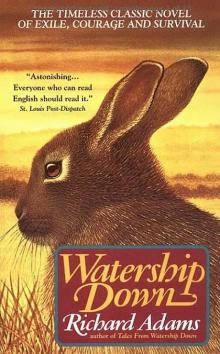 Watership Down
Watership Down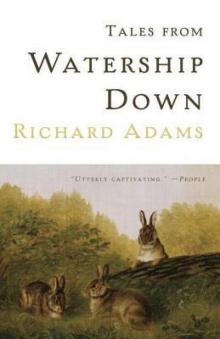 Tales From Watership Down
Tales From Watership Down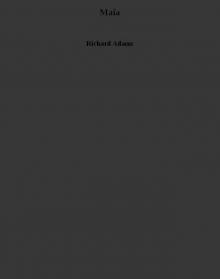 Maia
Maia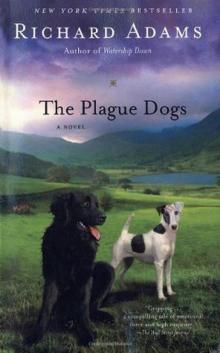 The Plague Dogs
The Plague Dogs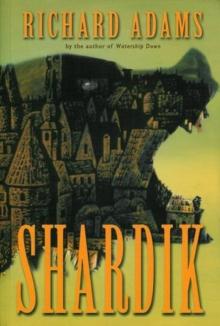 Shardik
Shardik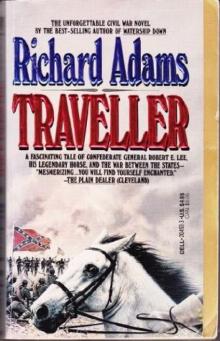 Traveller
Traveller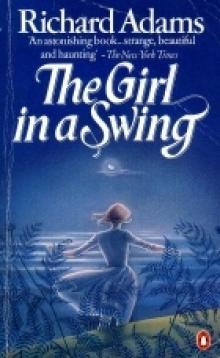 The Girl in a Swing
The Girl in a Swing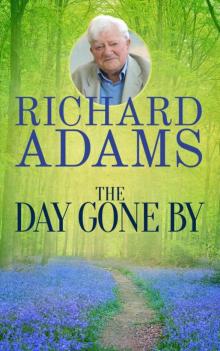 The Day Gone By
The Day Gone By Daniel
Daniel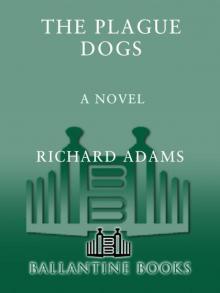 The Plague Dogs: A Novel
The Plague Dogs: A Novel